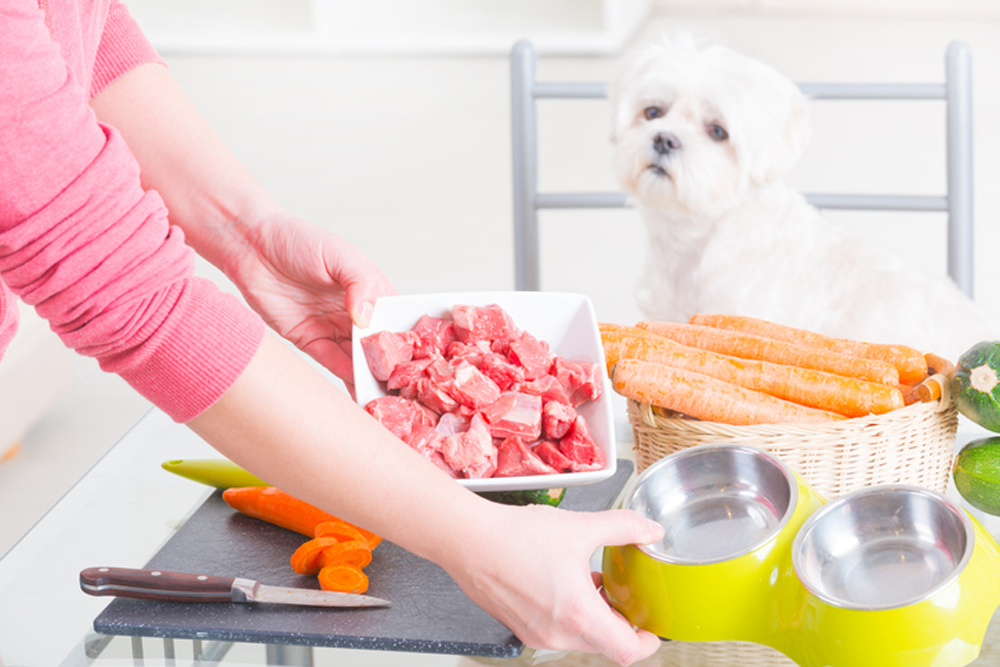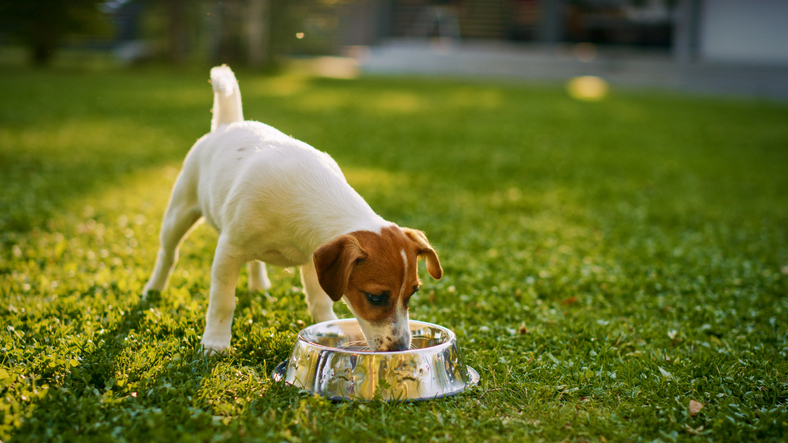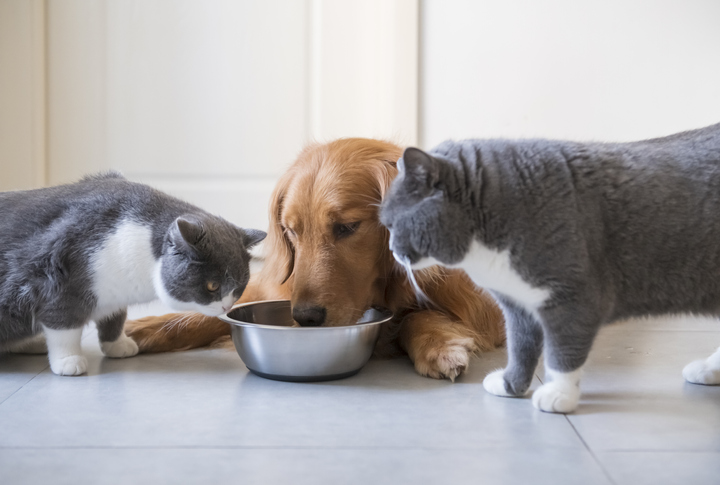
Can you feed an older dog puppy food?
24th June, 2021
Your beloved adult dog is now attaining senior status, and you're thinking about transitioning them to their own age-appropriate diet.
But wait! Your home life has just been joyously turned upside down with the arrival of a beautiful, playful puppy. He or she has bags of energy and curiosity – and also his or her own very specific nutritional needs.
The temptation may be to avoid the hassle of buying two separate lots of dog food, and to simply feed your adult dog the same puppy mix you're giving the little one. He loves it, after all – so why wouldn't his big brother?
But is this a good idea? Let's take a closer look at the dietary needs of your senior dog – and whether or not puppy food could work for them.
Do puppies and older dogs have the same nutritional needs?
First things first – what do your two friends each need from their food?
Puppies are growing fast and, as a result, puppy food is filled with the types of nutrients and supplements that support that rapid growth.
Of course, still being relatively small, they are not yet eating large portions – so puppy food is calorie-dense, allowing younger dogs to get the energy and nutrition they require without needing to eat more than their growing stomachs can handle.
No surprise, then, that – measure for measure – puppy food is higher in calories than adult dog equivalents. And, for this reason, feeding your older dog puppy food is generally not a good idea.
Apart from a few exceptions which we'll touch on later, puppy food essentially provides something quite different to what your dog needs in the latter stages of his or her life.
Puppies need a diet rich in calories and protein, to help them grow and develop strong, healthy bones, organs, muscles and joints.
In contrast, your older pet is probably becoming less active over time, and their metabolism will also be slowing down. As such, they need a diet lower in calories even than the one they had as a mid-life adult.
Once your dog has finished growing (and this varies across breeds, but it's typically somewhere between eight and 16 months), eating the kind of calorie-dense food that your puppy's now enjoying will mean another sort of growth altogether.
Your senior dog will start to put on weight, and conditions like obesity and osteoporosis could be just around the corner. It's worth noting here that, in the event of any illness, it's advisable to make sure that you have some comprehensive pet insurance for older dogs.
Another factor is that older dogs' activity levels start to fall. So, again, if you're not lowering their intake to match this process, they again run the risk of obesity – and also of putting more strain on their joints.
Given this, it's a good idea to monitor your dog's body condition at regular intervals. Again, a suitable policy of pet insurance for older dogs may also be helpful here.
So, what is the ideal diet for an older dog? As we've seen, in their later years, canines can start to encounter a range of issues from obesity to kidney problems. As a result, diets for older dogs are especially designed to be lower in calories and protein.
The latter, in particular, is found in large amounts in puppy food, but can be a major cause of kidney problems for senior dogs.
So, in a nutshell, puppy food and senior dog food have some very different functions and ingredients, and the rule of thumb is that you should not give older dogs puppy food.

The right nutrition at the right time
As pets get older, it becomes crucial to give them the correct nutrition. One thing you'll probably notice as your pet ages is that their appetite may well decrease as they are, naturally, less active than before and they might start sleeping more. At this stage, it's a good idea to discuss your dog's nutritional needs with a pet care specialist.
As your dog grows older, their bodies and digestion begin to change and their immune systems may need some extra support. Because of this, it may be a good idea to gradually move your older dog over to a specially formulated senior dog food mix.
Your dog's nutritional needs and eating habits will be changing as they get older, and this senior formula will contain the right balance of nutrients to offset these changes – and to ensure that your beloved pet continues to be in the best health possible.
Of course, something else that you'll want to be thinking about at this stage is some suitable pet insurance for older dogs, to help you achieve the best possible level of financial protection in the event of any expensive medical procedures.
So, when does my dog become 'senior'?
So when is the right time to switch your dog over to senior food? This is not an exact science, as factors such as size, breed and weight all help to determine the age at which your dog attains senior status.
In general, larger breeds tend to have slightly shorter life expectancies, meaning that a Great Dane might attain senior status at the age of five or six, while smaller breeds such as beagles or schnauzers would be classified as older dogs at around eight or nine.
"But I want what he's got!"
If you do have a puppy in the house as well as your much-loved older dog, you may come up against the problem of food sharing. It’s quite common for one pet to want a taste of what the other one has in their bowl.
A little taste of each other's food every so often should be no problem – but you shouldn't let them get into the habit.
But how to avoid this, when your older dog is looking lovingly at the tasty treats in puppy's bowl?
If possible, feed your dogs in separate rooms – and don’t leave their food sitting around. A really good way to keep on top of who's eating what is to introduce scheduled and/or monitored feeding.
Feed each pet at a certain time, ideally away from their companion and at a time when you can be around to make sure there's no sharing going on.
If separating them is tricky, a switch to an all-life-stage diet (see below) could be another way to ensure that everyone is getting what they need.

What to do if your dog is undereating
There are some cases, though, where it might be appropriate – temporarily, and with a vet's recommendation – to feed an adult dog a little of that more calorie-rich puppy food.
If your older canine is severely underweight – perhaps because of illness, for example – your vet may suggest a short regime of a calorie-rich diet like puppy food, in order to rebuild that all-important muscle faster.
After all, if your senior pet is regularly turning away from their food bowl, or drastically cutting their portion size, results will include weight loss, lethargy and sometimes – and most seriously – dehydration. Learn more about the reasons behind your dog rapidly losing weight in our recent blog.
In this case, a calorie-rich diet like puppy food could, over a short period, help to close up that gap.
In the longer term, though, you'll want to look at why your dog has lost their appetite – and to try some ways of helping them to get it back.
First up, find out if the loss of appetite is due to any factors such as illness or disease. If your dog is going through a period of noticeable weight loss, you should get him or her examined by a vet to make sure that the problem isn't being caused by a heath condition.
Weight loss is often simply part and parcel of a dog's ageing experience, but if the loss is noticeable, or over a prolonged period of time, you should get your dog checked out.
And, if you are on this journey, it's a very good idea to make sure you have a good form of insurance for older dogs from the outset.
Keeping those nutrient levels high
If the vet gives you the all-clear and yet your dog is still shedding the pounds, there are things you can try to keep their appetite vigorous.
These include feeding them premium food: if their appetite is diminishing and their bodies are finding it difficult to absorb the nutrients from their diet, you'll want to be offering the best quality, most nutrient-rich food on the market.
In this case, the low-fat or low-calorie options available for some older dogs are clearly not what you require. Instead, look for foods that contain above average caloric density (upward of 400 K/cal per cup), above average protein content (35% or above), and above average fat content (15 – 20% or above).
And this is where puppy food can form a part of the solution. Sometimes a premium puppy food formula can work well for older dogs because it is also higher in calories and more nutrient-dense than adult dog food.
If you do go down this route, a mixture of dry food (for the greater nutritional value) and wet food (for hydration, and for ease of eating) is a good idea.

Good food at every age: all-life-stage foods
So, a bit earlier we were telling you that your older dog requires a different diet to your puppy. And that is, for the most part, true.
The exceptions here are those 'all-life-stage foods', such as Canagan, which – as long as they are fed in appropriate quantities – are designed to meet the needs of dogs of all ages, from puppies right through to older pets.
There are some key nutrients, such as omega fatty acids, that are required by both puppies and adult dogs. The trick that the all-life-stage foods manage is to include these nutrients at levels that are safe for adults – but also suitable for puppies.
The key here is to make sure that your dog is getting the right portion size according to their age. You'll find detailed portion size instructions on the packaging.
To sum up - the best food is the most age-appropriate food
Allowing your two household buddies to share their food may be a tempting prospect, but as a rule of thumb your older dog is going to need quite a different dietary regime to your fast-growing, calorie-hungry puppy.
Puppies' food is deliberately crammed full of calories and protein, to support their growing bodies (and all that energy they've got!).
On the other hand, our older dog friends have started to slow down, and certainly aren't growing anymore – which means that the calorie count for a senior dog's food has dropped off significantly from its puppy equivalent.
Add too many calories, or too much protein, into the diet of a less active senior pet, and problems from obesity to osteoporosis could be lying in wait. Whatever your dog's later-life health prognosis, we'd certainly recommend taking out some form of pet insurance for older dogs.
In general, given those reduced activity levels, obesity is more of an issue than excessive weight loss among older dogs – and this is why a calorie-rich diet such as puppy food is, in most cases, not appropriate.
However, as we've seen, loss of appetite among older dogs can sometimes be a factor.
If this is not traced by your vet to some underlying health condition, it may be that your dog simply isn't getting enough of the nutrients they need and, in a few cases, a nutrient-rich regime such a puppy food may provide a short-term solution.
Always check with your vet, though, before embarking on any radical change to your dog's diet.
In general, though, the best diet that you can provide for your senior pet is a dedicated senior dog food regime, with its carefully regulated calorie counts and nutrient mix.
Adherence to a specialist senior diet like this, along with other key factors like choosing the right exercise regime for your dog, should boost the chances of a happy, healthy old age for your beloved pet.
Interested in learning what other foods your dog can and can't eat? Read our blog all about this!
Protecting your older pet with Petwise
You want the very best pet insurance for your senior dog. At Petwise, we specialise in exactly that.
Benefits include a 24-Hour Vet Helpline and dental cover as standard.
Plus, there's no upper joining age limit. Why not get in touch with our UK-based team for a quick quote today?
Policy benefits, features and discounts offered may very between insurance schemes or cover selected and are subject to underwriting criteria. Information contained within this article is accurate at the time of publishing but may be subject to change.